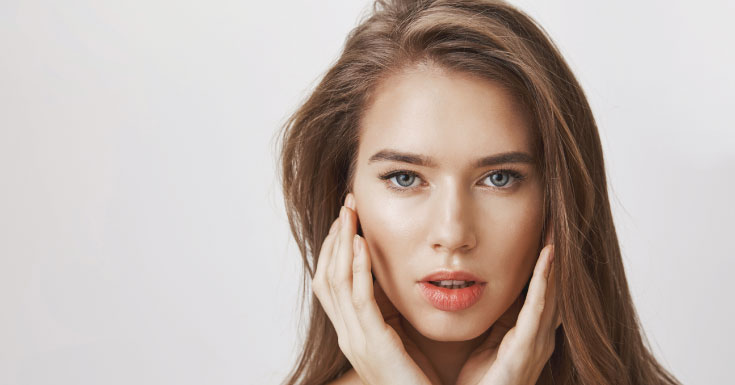It’s tough having sensitive skin. Even after trying various skincare products, from gentle to organic, nothing seems to agree with your skin. In this article, Dr Low Dyoi-E, a Consultant Dermatologist from Pantai Hospital Cheras (PHC), discusses what causes sensitive skin and how simple skincare routines and products can help.
What is sensitive skin?
The term sensitive skin generally describes skin with reduced tolerance to the application of cosmetics and personal care products. Sensitive skin issues are often related to the face, especially the eyelids area. Armpits, groin and genitals may also be sensitive because of thinner skin.
This condition can be seen in a wide variety of ways with subjective symptoms such as stinging, itching and burning. There are also visible skin changes, including redness, dryness, scaling, peeling, bumps and hives.
How can a simple skincare routine help sensitive skin or other skin problems like acne, eczema, and other skin issues?
A multi-step skincare routine, especially with the usage of comedogenic products, might lead to the obstruction of hair follicles. This is where bacteria and inflammation can set in, causing acne and eczema. By simplifying the skincare routine, you will be able to reduce the obstruction of hair follicles, thus minimising the burden to sensitive skin.
What are some issues with using a daily multi-step skincare routine?
Skincare and beauty products are often studied for their efficacy on an individual basis, not as part of a multi-step routine. When you put multiple layers of products on your skin, you can’t always be sure of the active ingredients in each of them.
Another issue will be the compatibility when mixing the products together. Some of the active ingredients might not go well with others. For example, there might be ingredients that could deactivate the active ingredient or affect the product’s overall pH.
Can you give an example of a simple skincare routine that you would recommend to a patient who breaks out easily or is prone to skin irritation?
A basic skincare routine should include a gentle cleanser, moisturiser and sunscreen. Those who are acne-prone and have oily skin can choose a stronger cleanser to remove the excessive oil. The moisturiser can be skipped – try switching to a toner with retinol. Make sure your sunscreen is lightweight. As for those with dry skin, a gentle cleanser, moisturiser (especially with ceramide and/or hyaluronic acid) and sunscreen will be good enough. Toner is optional for those with very dry skin.
What are the three most essential products to use in a simple skincare routine?
A cleanser is mandatory. Leaving makeup residue on the skin can cause inflammation and premature ageing. Additionally, sunscreens are essential for Malaysians due to our sunny climate. A good sunscreen helps prevent premature ageing from daily UV exposure. Moisturisers also help maintain the skin barrier function and give the skin an overall healthy and hydrated look.
Some might argue retinol is an essential product for anti-ageing, but it must be used with care, especially for those with sensitive skin, as retinol might cause excessive skin peeling.
Besides these products, masks and face mists can benefit people with dry, sensitive skin, but they are not really essential for those with oily skin.
Not all of us can use the same skincare products or routines. For example, toner is one of the products that’s not necessary for everyone. It’s more suitable for those with acne-prone (oily) skin.
In fact, toners with retinol can reduce sebum (oil) production, thus preventing acne outbreaks. If a patient with dry skin uses the toner excessively, it might eventually lead to skin peeling and allergic skin reactions.
Products aside, how can we take better care of our skin?
Diet and hormonal factors play an essential role in our skin health. It is ideal for those with acne-prone skin to reduce carbohydrate-rich food such as rice, noodles, bread, and dairy products. Instead, consume more Vitamin C. Hormonal disturbances due to lack of sleep, stress and menstruation have been proven to worsen acne. Lead a healthy lifestyle, have a balanced diet, sleep early and don’t stress yourself too much. As for those with dry and sensitive skin, there is no harm in taking probiotics to help enhance the skin barrier function.
Simple skincare also means simple ingredients in the products. In your opinion, what ingredients should we avoid?
Whenever possible, try to avoid using products with synthetic fragrances. They might give the products a welcoming smell, but prolonged use would bring about allergic contact dermatitis. Parabens are inexpensive and a common preservative used in many skincare products to keep the product fresh. They also prevent the product from harbouring harmful bacteria. There have been an increasing number of allergic skin reactions following the usage of products with parabens.
Another ingredient, Sodium Lauryl Sulfate (SLS), is a foam booster and cleansing agent that might irritate your skin, eyes and lungs. It can also trigger allergies. Sodium Laureth Sulfate (SLES) is much gentler and doesn’t strip the epidermis of any excess moisture. Sodium Lauryl Sulfate (SLS) is actually the parent chemical modified to make Sodium Laureth Sulfate (SLES). Both SLS and SLES are commonly found in shampoo, body wash and bubble baths. Fortunately, many manufacturers nowadays have reduced the use of SLS and SLES in skincare products.
In skincare, no one product applies to all. Thus, skincare routines need to be individualised, whether you have normal or dry skin oily or sensitive skin. For people with sensitive skin, choosing simpler products and maintaining a no-frills daily routine for washing and moisturising your skin can help you achieve healthier skin and keep irritation and redness at bay.

Consultant Dermatologist,
Pantai Hospital Cheras (PHC)
















